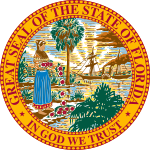| ||||||||||||||||||||
| Turnout | 62.6% | |||||||||||||||||||
|---|---|---|---|---|---|---|---|---|---|---|---|---|---|---|---|---|---|---|---|---|
| ||||||||||||||||||||
DeSantis: 40–50% 50–60% 60–70% 70–80% 80–90% >90% Gillum: 40–50% 50–60% 60–70% 70–80% 80–90% >90% Tie: 40–50% 50% No data | ||||||||||||||||||||
| ||||||||||||||||||||
| Elections in Florida |
|---|
 |
|
|
The 2018 Florida gubernatorial election was held on November 6, 2018, to elect the next governor of Florida, alongside an election to the United States Senate, elections to the United States House of Representatives and other state and local elections. Incumbent two-term Republican Governor Rick Scott was term-limited and could not run for a third term, and he successfully ran for Florida's Class I Senate seat.
Republican U.S. representative Ron DeSantis narrowly defeated Democratic mayor of Tallahassee Andrew Gillum for the governorship, in what some considered an upset. The candidate filing deadline was June 22, 2018, and primary elections were held on August 28. Florida uses a closed primary process, in which the selection of each party's candidates for a general election is limited to registered members of that party;[3] Gillum won the Democratic primary and DeSantis the Republican primary.[4]
The close margin mandated a machine recount, which had a deadline of November 15, 2018. After the recount was complete, DeSantis was certified as the winner. Gillum conceded on November 17. DeSantis's victory marked the sixth straight election in which Florida elected a Republican to the governorship, and the third in a row that neither candidate received over 50% of the vote. With a margin of 0.4%, this election was the closest race of the 2018 gubernatorial election cycle. Gillum became the first Democrat to win Duval County since 1986 and Seminole County since 1990, while DeSantis became the first Republican gubernatorial candidate to win Jefferson County since 1884.
- ^ "November 6, 2018 General Election". Florida Department of State. Retrieved May 15, 2022.
- ^ "November 6, 2018 General Election — Voter Registration and Turnout". Florida Department of State. Retrieved June 5, 2022.
- ^ "Florida gubernatorial and lieutenant gubernatorial election, 2018". Ballotpedia. Retrieved March 28, 2018.
- ^ "Florida Governor Election Results: Andrew Gillum vs. Ron DeSantis". The New York Times. Retrieved November 7, 2018.






